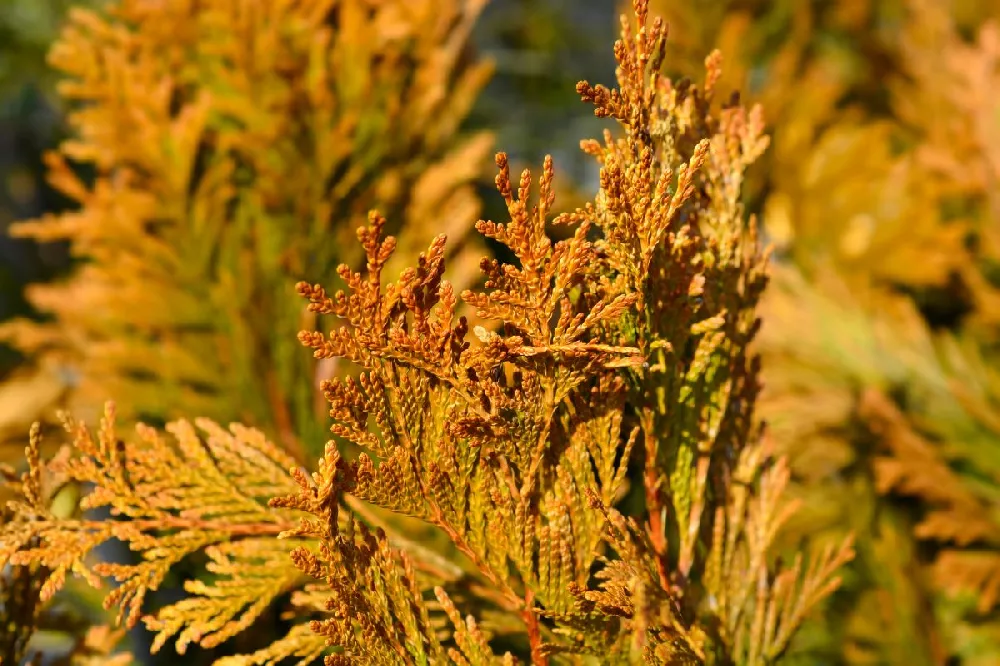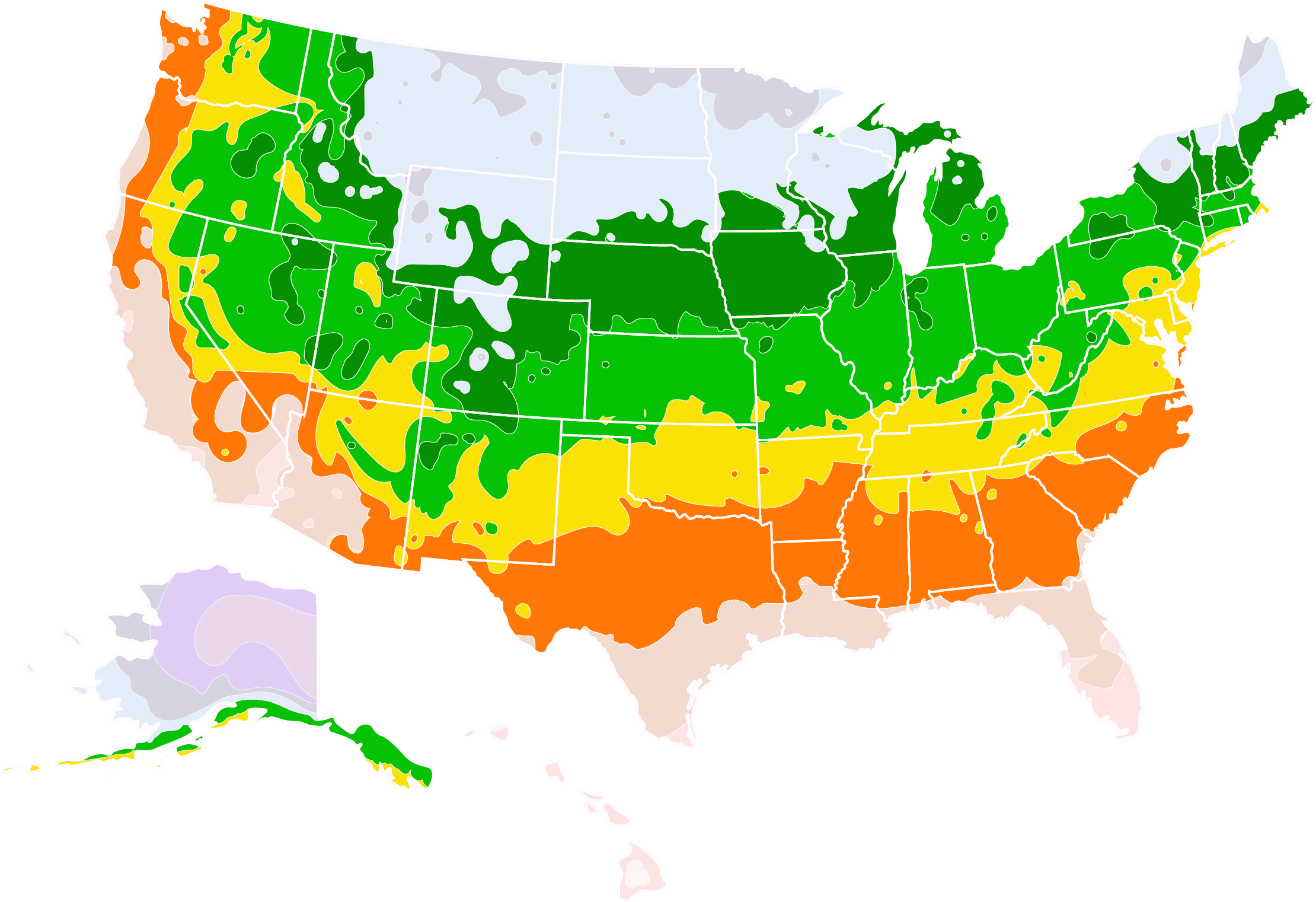- Home >
- Ornamental Trees >
- Ember Waves® Western Arborvitae Tree
Ember Waves® Western Arborvitae Tree for Sale - Buying & Growing Guide
The Ember Waves® Western Arborvitae Tree, Thuja x 'MonPin,' proves it's possible to get the best of everything in a single plant. Like other thuja trees, this one is carefree, disease-resistant, and easy to grow. But, if you think the look of arborvitae is ho-hum, take another look at this cultivar. The show begins in spring when new growth appears that is a bright sunshine yellow. The foliage slowly deepens to a darker green with vivid chartreuse tips. In fall, you're in for another show, when the foliage turns gold and then a golden orange, providing contrast to other plantings. In winter, that foliage offers a startling color backdrop for a snowy yard or garden, adding texture and color to brighten gray landscapes. Here are a few more reasons to add this spectacular cultivar to your garden:
- Can be pruned to form a hedge or topiary.
- Grows throughout most of the U.S.
- Can be grown in a container for use on decks and patios.
Enter your zip code to find nearby stores that may carry this plant.
Plant Care
Sunlight

The Ember Waves thrives in full sun — site where it will get at least six hours of direct sunlight a day.
Watering
Water a few times a week for the first growing season; after that, rain should give it enough water.
Fertilizing

Fertilize with a balanced, slow-release fertilizer designed for evergreen trees and shrubs.
Planting and Care
Planting instructions
Site your Ember Waves® Western Arborvitae Tree in soil that drains well and receives at least six hours of direct sunlight a day. If possible, plant your tree in an area that is blocked from harsh prevailing winds. Unpot your tree and tease out any encircling roots, which can girdle the tree and slowly kill it. Dig a hole that’s as deep as the root ball and twice as wide. Place the tree in the hole, spreading out the roots. Holding it upright and steady, fill in around the roots with topsoil, tamping down as you go to eliminate air pockets. Water thoroughly. Apply a two to three-inch layer of organic mulch such as bark chips around the root zone to conserve moisture and hinder weed growth but keep it from touching the trunk to avoid problems with rot.
Watering and nutrients
During its first year, water your arborvitae several times a week to help it establish a strong and extensive root system. After the first year, you will only need to water your tree when you are experiencing very dry or hot conditions. Fertilize your Ember Waves® Western Arborvitae Tree with a slow-release fertilizer designed for evergreen trees and shrubs. A 16-4-8 formula will work well.
Pollination
Arborvitae trees are monoecious, meaning that they have both male and female reproductive organs on the same tree. Instead of flowers, pollen is produced by male cones and transferred to female cones through the action of the wind.
Pruning
Monitor your tree for dead, damaged or diseased branches, which should be trimmed out whenever you see them. There is no need to do any further pruning unless you wish your Ember Waves® Western Arborvitae Tree to take on a formal shape or hedge. Left unpruned, it will mature to a loose pyramidal shape that is more vertical than horizontal.
Pests and diseases
Although the Ember Waves® Western Arborvitae Tree is resistant to disease and has few insect pests, keep your eye out for aphids, scale insects and pine weevils. A healthy tree can usually manage infestations with little problems, but if pest pressure is severe, consider releasing beneficial insects such as ladybugs and lacewings, which will attack the pests. Horticultural oil can also be used as a deterrent. The most common disease seen on arborvitaes is tip and twig blight, which turns the ends of branches brown. Prune out and discard any foliage that is impacted. A fungicide can also be used to prevent disease.
Achieving maximum results
One way to effectively use this cultivar in the garden is by planting it in a large container. Two pruned Ember Waves® Western Arborvitae Trees flanking a front doorway, for example, would be spectacular or imagine placing several on a desk or around a pool. Choose a container with large drainage holes that is about twice the size of the root ball. Plant as per our directions above using a good-quality potting mix. Keep in mind that potted plants tend to need more frequent watering and feeding than those planted in the ground. Container growing is also a good way for those living in northern climates below USDA hardiness zone five to grow this cultivar. In the winter, just bring the planter inside and leave it in a cool basement or garage, watering infrequently.
FAQs
Where can an Ember Waves® Western Arborvitae Tree be grown?
This arborvitae is hardy down to -10 degrees Fahrenheit and can be successfully grown in USDA hardiness zones five through eight. That includes much of the continental U.S., including coastal New England and as far south as northern Florida.
How big does this cultivar get?
The Ember Waves® Western Arborvitae Tree has a mature height of up to 25 feet, with a width of eight feet. If grown in a container, it will remain much smaller in size, and it can be pruned back to a manageable size as needed.
How is this arborvitae best used in my landscape?
With its spectacular show of colors throughout the growing season, the Ember Waves® Western Arborvitae Tree is a great choice as a specimen planting in a front yard or some other highly visible location on your property. Consider a planting of three of these trees grouped together on a front lawn. It is excellent when used as a border or boundary fence. It can be used as a foundation planting or to anchor a large bed of mixed shrubs and perennials.
Compare Similar Products
You can't add more Product Name - Product size to the cart.
OK








